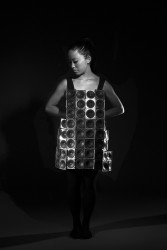 United States Glass, Sasaki, Dessner: Tim Fain (violin), Pauchi Sasaki (electronics), American Composers Orchestra / George Manahan (conductor), Zankel Hall, New York City. 8.12.2017. (DS)
United States Glass, Sasaki, Dessner: Tim Fain (violin), Pauchi Sasaki (electronics), American Composers Orchestra / George Manahan (conductor), Zankel Hall, New York City. 8.12.2017. (DS)

Sasaki – GAMA XVI for Orchestra and Electronics (World Premiere)
Dessner – Réponse Lutoslawski (NY Premiere)
Glass – Violin Concerto No.2, ‘The American Four Seasons’
To mentor someone isn’t quite to teach them. And to be mentored by someone can mean so much more than just to be taught. So, what is the relationship, exactly? At Zankel Hall, in a recent American Composers Orchestra performance titled Reflected in Glass: Philip Glass and the Next Generation, a glimpse into one such mentorship appeared. Through the Rolex Mentor and Protégé program, emerging composer Pauchi Sasaki was paired to work with compositional guru, Philip Glass. In a lively interview on stage with moderator and ACO President Edward Yim, Glass said he chose to work with Sasaki not only because her work should be heard, but because she would make an invaluable contribution to the music of our time. Most of all, Glass said, he encouraged her to be who she is; the best mentors remind their charges of obvious life tenets that are easily forgotten.
Glass’s comments came after hearing the ACO in Sasaki’s GAMA XVI, for orchestra and violin solo with electronics and ‘speaker dress’. Visually gripping, with 100 small speakers attached to her body, Sasaki manipulated the sound by using her hands in graceful, swirling and threading motions. Picked up by a webcam, those movements transmitted signals through locational-device software. On the wall behind the orchestra, rising and falling bars of light captivatingly accompanied the phrases. The violin solo, performed by Tim Fain, created a lyrically lulling contrast to Sasaki’s futuristic human electronics board.
The orchestra emoted snippets of Glass-like motifs, inspired by her mentor. In conversation afterward, Sasaki explained that her goal is to create abstract spaces with electronic sounds. Arguably, she did that by standing on the shoulders of her predecessor, whose early minimalist works brought a new kind of abstraction to Western classical music, dropping melody for rhythmic repetition and starkly unfolding harmonies.
Mentorship, however, doesn’t just come from the living. The evening’s New York premiere, Bryce Dessner’s Réponse Lutoslawski, takes extensive inspiration from Lutoslawski’s Musique Funèbre. Dessner has created a deeply provoking contemporary response, which captures the modalities and moods of the original but blurs the boundaries of ensemble, phrasing, and sound, in contrast to Lutoslawski’s profoundly modernist foundations.
The beginnings and endings of Dessner’s phrases took on an erased quality, similar to Rauschenberg’s ‘Erased De Kooning’ drawing. Fortunately for his listeners, Dessner drew his own version, which stands in its own right and requires exceptional precision and emotional focus, to be experienced at peak potential. The ACO almost hit the mark, but it’s no wonder that Réponse Lutoslawski might take a few more performance rounds to reach perfection.
Finally, music by the evening’s mentor himself was Glass, who reworked Vivaldi’s The Four Seasons with his signature minimalist language into Violin Concerto No.2, ‘The American Four Seasons’. Returning as soloist, Fain was spectacular, combining virtuosity, cosmopolitan style, and electric charisma. The violinist’s crystalline interpretations, which framed each solo interlude, showed his personal touch while maintaining a clear reading of the Glass style. And while Fain did not sport 100 speakers, he did leave his sartorial mark, wearing a crinkled slate jacket over textured jeans and, of course, high-top sneakers.
Against the backdrop of Glass’s landscape, new-generation composers and performers had no trouble carrying their distinctive personalities onto center stage. Perhaps that’s what makes a true mentor – someone with grandeur, who knows how to build the next generation.
Daniele Sahr
